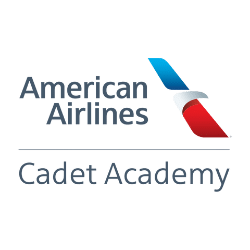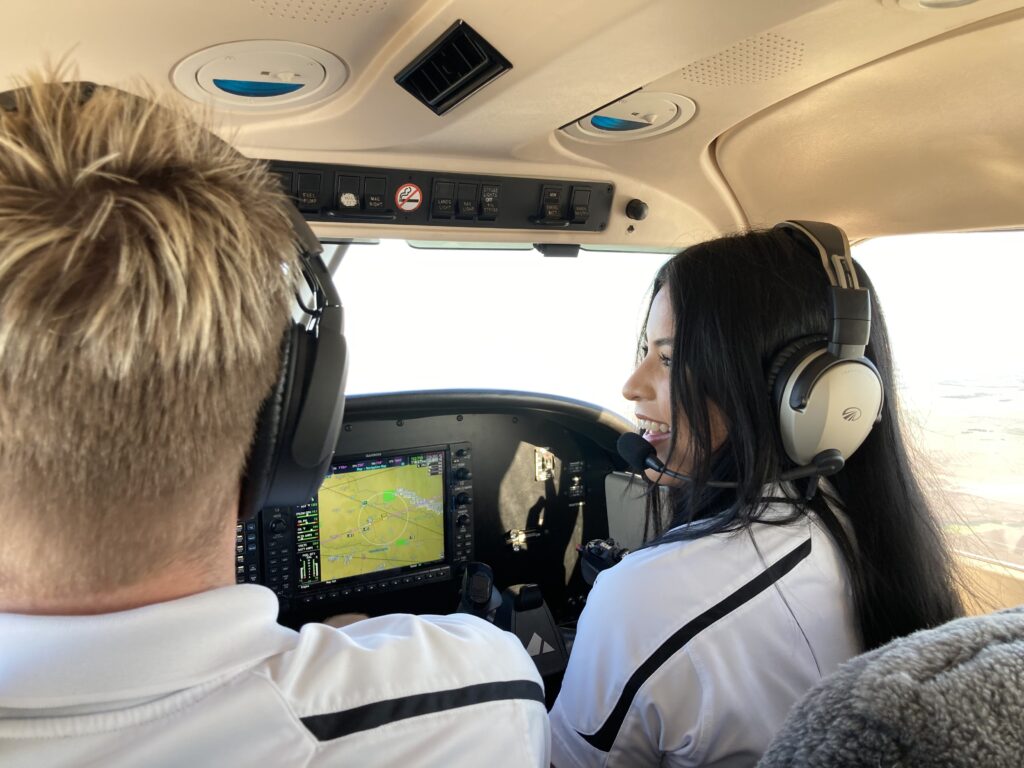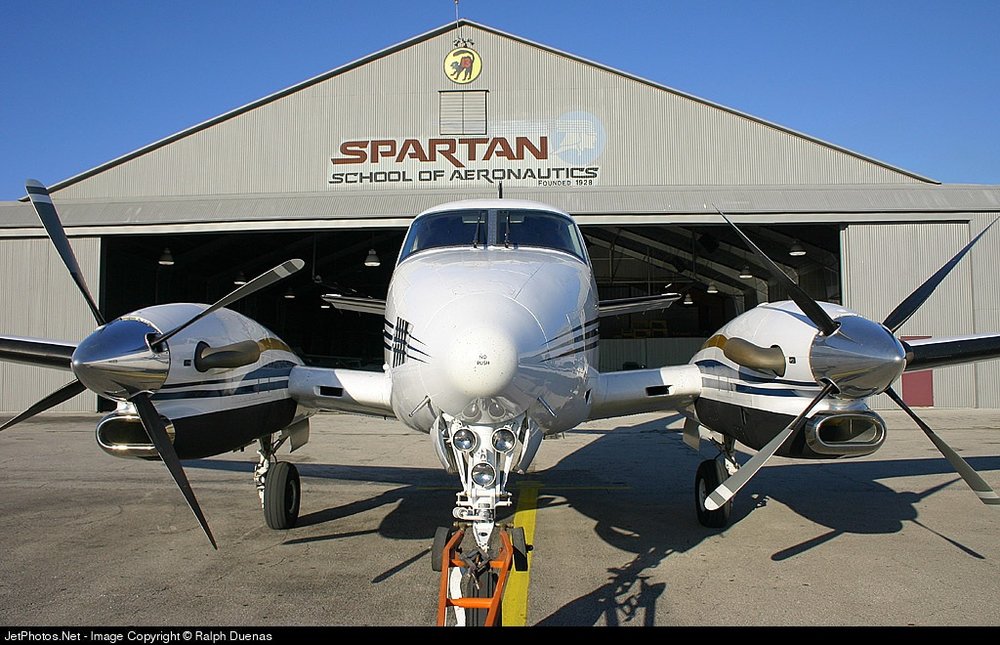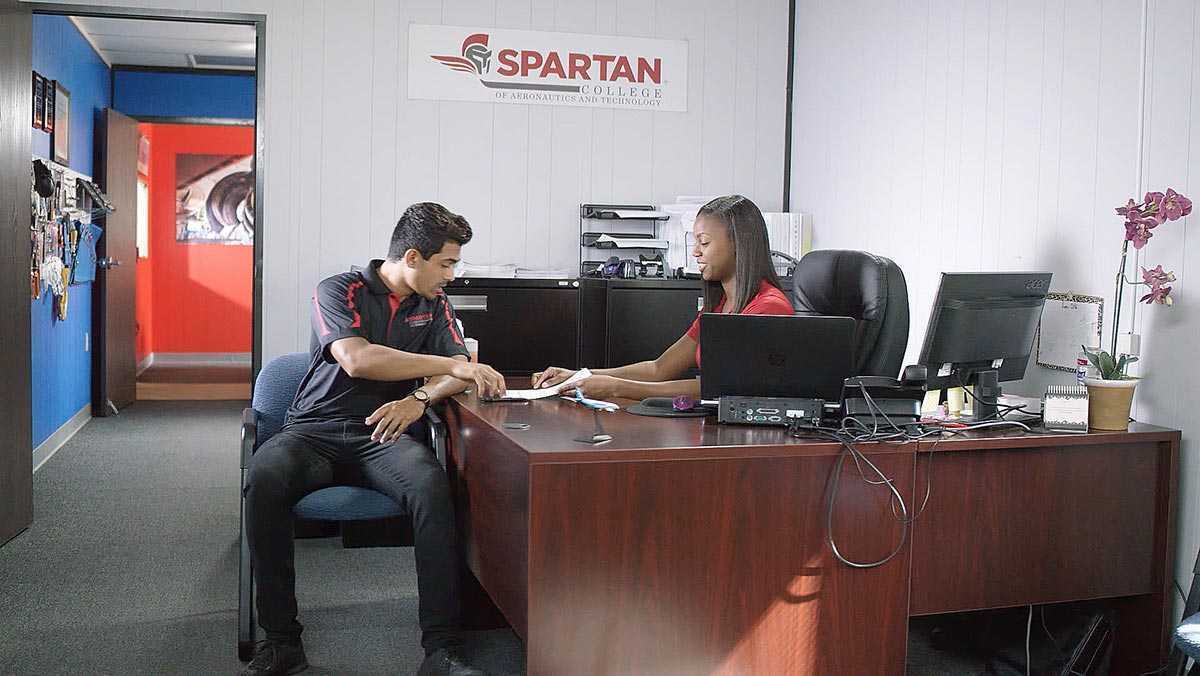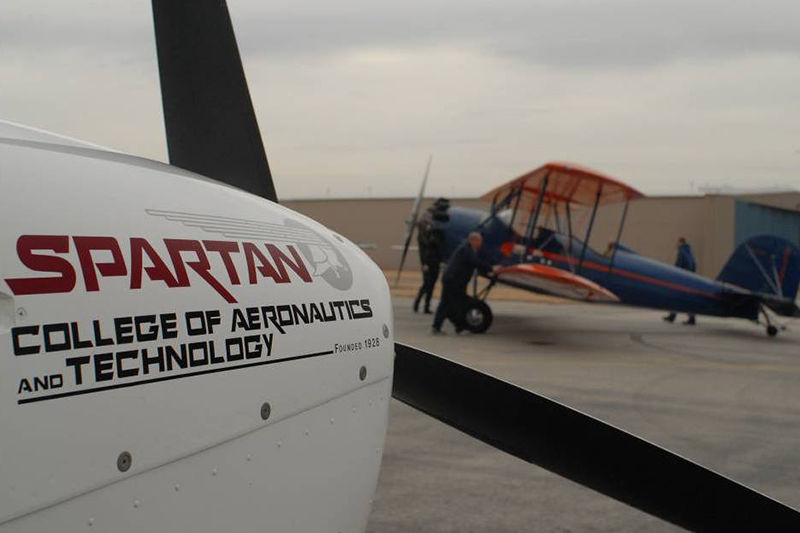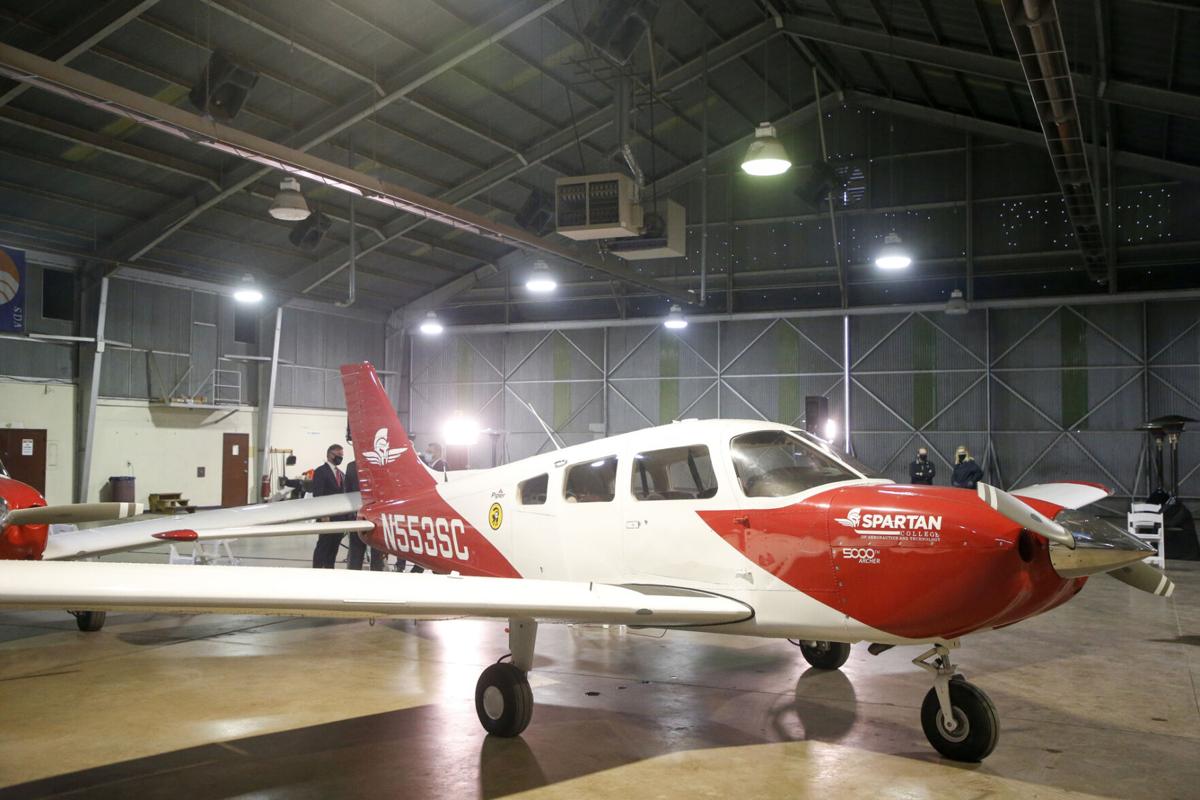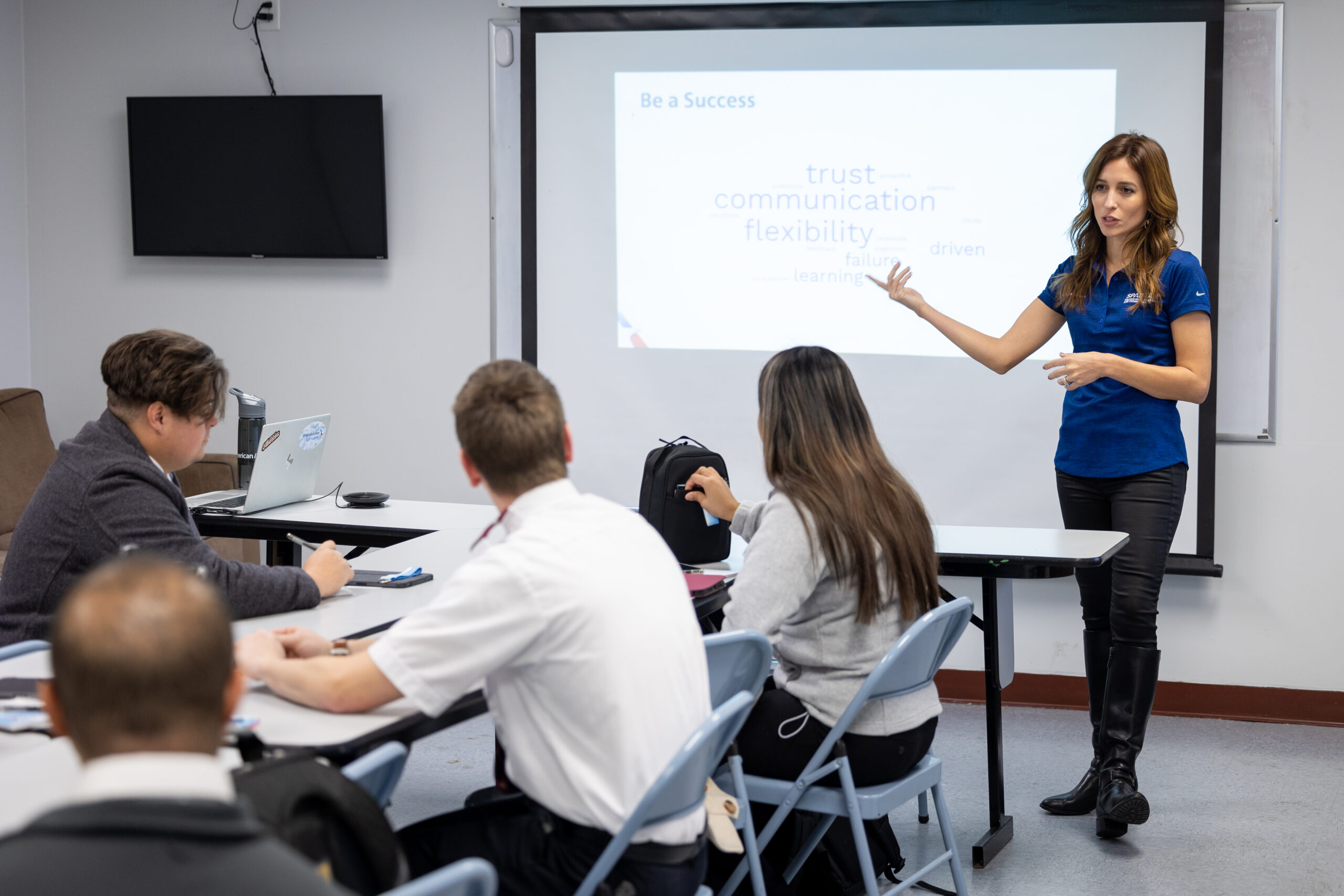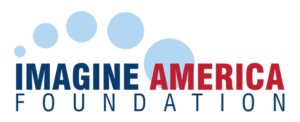Joining us today on Imagine America Radio is Robert Polston, the CEO of Spartan College of Aeronautics and Technology, and Jessica Ast, the aviation program manager at American Airlines Cadet Academy. Thank you both for joining me today. |
Thanks for having us. |
Thank you. |
Today, we would like to discuss pilot careers. And as a leading provider of education in aviation and one of the leading employers of pilots, we couldn’t think of anybody better to call than Spartan College of Aeronautics and American Airlines. Let’s start by defining the different types of pilots and how this partnership really works between Spartan and American Airlines is training the next generation of pilots to enter the workforce. Can you tell us a little bit, Rob, about how Spartan is helping train your students to enter the cadet academy and what the cadet academy is? |
Yeah. To start off, Spartan has been around for 94 years. It’s a college that was started in Tulsa, Oklahoma. We actually still operate out of the same campus where they started making airplanes 94 years ago. |
Wow. |
So it’s got a long rich history in the aviation industry. This past fall, we partnered, we formed a partnership with American Airlines for a couple of reasons. One is American actually was very innovative early on, started the American Cadet Academy several years ago and has been carefully choosing partners to deliver really ab initio flight training to help build the American pilots and the need in the future for new pilots and to support its growth. So we’re very excited. This past fall, we formed that partnership. Spartan is, to answer your question, Spartan is the only collegiate partner in the American Cadet Academy today. We’re a little different than some of the other options in a couple of ways. One is that we are, as I say, the college. So our programs, although they’re meant to be efficient and provide you the skills to become a pilot, they are also accredited. So we offer an associate’s degree to students who come to our program. In over a 17-month period, our students start from maybe never having any flight experience or having very little, and we train them from becoming that first hour at ground zero with zero hours through a 17-month program that prepares them both technically to become what is called a certified flight instructor and then to go on and build their hours towards becoming a pilot, a licensed pilot. So our curriculum covers everything from the ground school through different stages of certifications in order to become qualified to become a certified flight instructor and earn your associate’s degree at Spartan. Again, we’ve been around for 94 years. So we feel like not only do we have the technical background to provide the skills needed, but also we bring a lot of that experience where we’re trying to help very young students, mostly out of high school, some who are changing jobs, really adjust to the workplace and become leaders in the cockpit. So this accelerated journey of becoming a leader, of maturing in your career, that’s all part of what we do as a college of higher education, not just a training company. |
Yeah. No, that makes perfect sense. You’re really taking somebody from having little to no experience and in some cases at a younger age, 19, 20 years old. And it’s important for them to get that education and that background, and I’m sure it helps them excel into what I want to kind of jump into here now with Jess, which is, okay, they go to Spartan, they get their training, their certified flight instructor training. Now, they’re being passed along to American Airlines through the cadet academy. Walk me through that process and sort of where American Airlines comes in. |
Yeah. So kind of working with what Robert said, the American Airlines Cadet Academy partnership and Spartan College, they run parallel to each other and they complement each other very well. So it is correct that they are the first collegiate program that we have partnered with. And a lot of that reasoning is because we have many cadets that enjoy coming in, they want to do flight training, they want that intense training program along with the American Airlines representation, but we also have a whole lot of cadets that come in that are really looking for that collegiate education in addition to the flight training. Several additional benefits between American Airlines and Spartan College with this partnership, obviously, the support of American Airlines is a big one with the cadet academy team. We have an incredible mentorship program that we’re going to bring to Spartan now that this partnership is rolling, and that is with our American Airlines mainline pilots. They are paired with a cadet to help ensure their success and supportability in that. And then in addition to that, just the cadet’s journey through this career, Spartan brings a really great opportunity with the higher education piece to allow for reduced ATP, which is an Airline Transport Pilot minimums, and that takes it from– our average cadet has to get 1,500 hours in order to reach that potential of an ATP; whereas, with Spartan college, this allows them to have 1,250 hours to reach that ATP. Just an added benefit. |
Yeah. So they’re getting sort of a heads-up or a jump start on the career path with the cadet academy coming out of Spartan. |
Yes, they do. They do have a jump start. |
Awesome. Okay. Now, Rob, can you tell me a little bit about the career outlook and what that looks like for pilots? |
Yeah. What’s really interesting and what’s happened over the last several years is that the number of pilots and the number even of mechanics in the United States has continued to decline. And that’s really driven by a couple of things and one of the reasons we’re here. The first one is there’s a mandatory retirement age for pilots at age 65 under federal regulations. So there’s a lot of pilots that are retiring over the next several years. That is going to increase the demand for replacement pilots and also to support the growth of airlines, not only American, but other types of airlines, people who are doing cargo, people who are doing commercial, private. There’s a lot of demand and need for pilots because air travel is growing. In the United States right now, from here to 2040, there is a need for about a 130,000 new pilots that are estimated to be needed by the industry. And I wanted to come back to one of the points about how we prepare students. It’s not only about what you get at the end of the program, but it’s what happens inside the program. We have a number of, I would say, basic but fundamental factors that make Spartan and this partnership with American so unique. |
First of all, we’re located in a terrific city, in Tulsa, Oklahoma. So we have lots of great weather to fly in. Sometimes it’s challenging, but that actually prepares you for a challenging career. And so it gives you the real elements you’re going to face when you’re a pilot right when you start from day one. We have advanced aircraft. We have Piper Archers and Seminoles, new Piper Archers and Seminoles which are some of the best training aircraft in the industry. And modern. Also, that comes with great technology. Garmin technology that allows you to feel like you’re having a really frustrating experience in terms of training. Our airspace and our airport, very important also to the training environment. You want to be in places where there’s opportunities to train safely, to learn in environments where it may be challenging from weather, but it’s also places where there’s ability to learn without being in too much commercial traffic. So there’s a lot of ingredients that go into not only the curriculum and not only the approach to developing pilots and to mature new students, but also having all the right levers while you’re training because it’s a challenging career path. That’s why we need a 130,000 new pilots. These are people who are responsible for the safety and security of our air space. And those flights that you go on every day and maybe take for granted, it starts here in the Kinetic Academy and training people the right way and preparing for a very serious career. And a fun one. |
Yeah, yeah. I mean, every time I talk to you at Spartan, I’m always reminded of how fun the career path sounds, but also the importance of getting an education and having that learning environment that you talked about, which I’m sure just helps them prepare for that next step in the career, the Kinetic Academy just being vitally important. And like you said, about Tulsa and having your own airport and getting them familiarized with all of the ins and outs of being a pilot, I could see tremendous value in that. Now, Jessica, are you seeing something similar as far as the demand goes for pilots on your side? |
Yes, absolutely. I mean, all airlines are seeing the demand. It’s an industry wide. We all know that there’s a mandatory age of retirement. And so a couple of things that the Kinetic Academy is doing to engage early on and create that exposure and that pathway in order to help support our airline, involves just getting as early as elementary school. And we go, and we just want to excite them, we have an entire team that goes out with this initiative just to educate, excite, expose, and then we carry that through high school. And just allowing them to see what we can do for them. And the reality is a lot of people think it’s a dream, but it’s actually a real deal that you can pursue. And that’s why the Kinetic Academy was created was to help provide that opportunity where it may not otherwise exist for that individual. And so while the Kinetic Academy is here and it’s strong and it’s growing with partnerships like Spartan, we obviously aren’t going to bring all of the pilots through the pipeline. And so what we want to do is just allow the possibility to occur. Look at those that may not have that opportunity, just educate them on, “Hey, you can go to all different through all different pathways, but here’s what we provide. Here’s what’s been created.” And hopefully, get that dream cadet into the flight deck someday. |
Yeah. So let’s walk through the timeline of getting to that flight deck because I know that Spartan, you have your program, and that’s a certain length. And then you go from Spartan to the Kinetic Academy. Walk me through basically zero hours of training to commercial airline pilot that’s piloting the plane I’m about to get on tomorrow. Walk me through that. |
And just to be clear, actually, the American Cadet Academy is where the journey starts. As Jess just said, they are prospects who want to go through to the Cadet Academy and be accepted. That’s actually where the journey starts. And then at Spartan, we train cadets for the Cadet Academy, those students who choose to come to Spartan as part of their training. So we’re really tied at the very beginning through the process. And to answer your question about the time, it takes about 17 months. That is the prescribed amount of time from the time you start at zero hours, go through ground school, and get your certifications through commercial, instrument, private, and then CFI and multi-engine. It takes 17 months to get to that point at Spartan, where you then have an associate’s degree and you begin what’s called certified flight instruction. And mostly that happens with our cadets at our school. They go on and become instructors for us. And that’s where the time building begins. So as Jess said earlier, on top of the roughly 250 hours you have after 17 months, you need an additional 1,000 hours in order to qualify to take the certification, the ATP, in order to go on and have your pilot’s license. So the journey takes roughly 17 months plus I would say somewhere between a year and it could take a year and a half, depending on how quickly you can progress as a student through that time-building period. But roughly, I would say two and a half years. Some people take a little longer. Some people can go quicker. |
Wow. That’s pretty incredible. You could go from somebody who doesn’t have any real background. And then two and a half years later, being a pilot and up in the air. I think that’s fantastic. Now, let’s say– |
It’s a real apprenticeship business. The safety and security is what’s of the utmost importance. So even when you’re done training, there’s still– and you get your ATP, you’re still going into either usually a regional airline or sometimes directly to the majors. But it still is about building confidence and experience to be able to become a first officer and then eventually a captain. So it truly is– while it seems like a quick career path, there’s a lot that goes into becoming a pilot at a commercial airline and there’s several steps in between. |
Okay. Now, let’s say I’m a student and I’m interested in becoming a pilot. You talked to me at elementary school, Jessica, and I remembered and I’m like, hey, I want to become a pilot. Now, what are some things that I should be looking for in an educational institution that help prepare students for this career? Should I be looking at accreditation? I know you mentioned accreditation earlier. I think that’s important. Also, relationship with employers. I mean, we’re obviously talking today on today’s podcast a little bit about that. But what should I be looking for in a school that’s offering a pilot program? |
I would say the first thing that you want to look at is, is it the right fit for you? There’s a lot of ways to become a pilot and one thing about the Cadet Academy is it is a fast-track program. So it’s very intense. And that might not be the right fit for everybody. College might not be the right fit for everybody. So that’s why there’s a multitude of options out there. One thing being connected with Spartan, and in partnership with them is that we’re bringing that employer sense to this from a future employee status. So we go in with our indoctrination classes, which is just an introduction to welcome to our partnership, welcome to being one of our cadets, this is what we expect from you. And one of the top things we say is, “This is an interview for American Airlines,” from day one. We don’t just show up and say, “Great, you’re now a partner,” and we’re out the door. We accept cadets into the academy that we see potential in our flight deck down the road. And it’s not that many years down the road, just like Robert said. While we don’t necessarily guarantee a job with American Airlines, we do offer that guaranteed interview with our regional carriers. So we are constantly looking at a cadet and how they build their portfolio. A couple of things that we look at as being a success would be, how they progress through their flight training, their performance, what they do surrounding them. Are they a leader? Do they help the success of the other cadets and their peers? Do they take charge of their flight training? It is a very proactive training style. And Spartan offers more of the in-class, but you still have a lot of responsibility on your plate to be able to do that. Soft skills of being able to communicate with everybody around you. You’re not just communicating with the pilot next to you. A pilot is in the flight deck, and they are in charge of that aircraft. They’re in charge of the crew, the passengers, where it’s going, how it’s operating. And you have to talk to ground ramp, the air traffic control tower, passengers, your agents. And you just have to be able to be flexible in working with everybody around you. A couple of other things that we definitely look at, especially through the cadet academy and we try to offer the opportunity for is building your network, so not just with the pilot mentorship program, but with the exposure of organizations, opportunities to volunteer, help us with events. So again, just building your entire portfolio because we want to be able to speak towards your reputation. We have the connections not only just with the college, but also with our regional carriers. Envoy, PSA, and Piedmont are wholly-owned carriers. We want them to come in and speak with you. We want to showcase who we bring through this program. |
Makes sense. Rob, is there anything you would like to add to that? |
I actually think you said it perfectly. I think what we’re doing together is to raise awareness of the aviation career paths that are available, that a lot of people really actually don’t know about. They might have a connection to someone in aviation, but generally when we go into classrooms or talk to students, they never thought about aviation as a career path. So we’re trying to raise awareness, number one. And then I think, number two, as Jess said so well, is there’s a lot of opportunities for people to gain the skills that are necessary. But we’re looking for that raw talent, that ability to communicate, to be a leader, to have technical skills, to keep it all in a perspective that you know that you’re going to be successful down the road. Being a pilot is a great career. There’s so many great opportunities, but it also comes with a lot of responsibilities. So it’s a place where we want people to understand it’s a reachable career it’s something that you can obtain if you have the basic skills and I would say ability to become to become a pilot. And because of our efforts, I think we’re reaching more audiences than we ever have to make this a more accessible career to many more people in the United States than have ever even thought about being a pilot. |
That’s great. And I’m hearing you talk about skills and things that individuals need that make them employable. Let’s talk a little bit about that because let’s say I’m somebody who’s interested in becoming a pilot. Oh, and we talk with counselors all over the United States all the time. What are three or four personality traits or things that sort of tailor somebody like, “Hey, this would be a great pilot,” that might help identify somebody or might help a counselor identify somebody that would be a great fit for this career choice? |
Well, I mean, from my perspective, I think there’s really kind of two core skills. To me, as Jess said, it’s leadership, the ability to be a leader. You are an integral part of what happens when those flights take place down the road. And you’re in charge of that– in charge of that aircraft. So being able to lead people and to be confident, I think, is obviously one very, very important trait. And then technical ability, ability to absorb I wouldn’t say overly complex material. But there’s a lot of material that goes into being able to operate an aircraft. There’s a lot of technology, and it’s very exciting. So those are sort of the things that I look for and people who are driven. I see many people in aviation, they’re entrepreneurs. And they’re driven to do something exciting in their career and be flexible and open to an adventure. Jess, I didn’t know if you wanted to add anything. You did such a good job on what you look for. But maybe on the question of what makes what makes an American cadet or just a pilot? I don’t know if you had the same view that I did, but maybe you want to [crosstalk] on that. |
I had [crosstalk], communication, and motivation. And I’m like, “Well, there goes.” The other one [crosstalk]. |
Oh, there we go. |
Something we look for in an interview is passion. There’s that raw passion? You can hear it in their voice. You can see it in the excitement of the interview, what they’ve done to get to that interview whether it’s a discovery flight or they’ve been proactive and asking questions, looking for people within the industry to get advice from. I will say that we have the saying where we say aviation is in your blood and it never leaves. So anybody you talk to that’s a pilot is ready to show off what they do. We love to do that. And we love to talk about it. You won’t stop us from talking about it sometimes. There’s just a lot of pride and good pride, just a lot of pride and excitement, just the eagerness to educate. And that’s why you’ll see so many of our pilots out at their kids career days or at small town events with us, all the way up to large industry events with us because they’re excited. They want to tell and talk about what they do. So I would say when you’re out there and you’re interested in being a pilot, there’s no stupid questions. Everybody’s ready to answer and show you what’s next. |
Yeah, that’s great. And what a critical career that is very well needed right now, becoming a pilot. I want to thank you, Rob Polston, presidency and CEO of Spartan College of Aeronautics and Technology and Jessica Ast, the aviation program manager at the American Airlines Cadet Academy. Couldn’t thank you both enough for joining the call today to talk a little bit about pilot careers. And I hope our listeners have gained some great knowledge after this interview. |
Thank you for your time today. |

